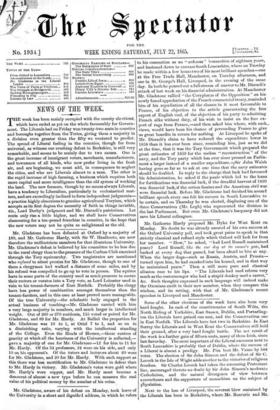Mr. Gladstone has been defeated at Oxford by a majority
of 180, and Mr. Gathorne Hardy, with Sir W. Heathcote, are now therefore the unillustrious members for that illustrious University. Mr. Gladstone's defeat is believed by his committee to be less due to the rural clergy than to the pressure of the Carlton Club exercised through the Tory squirearchy. Two magistrates are mentioned who refused to attest proxies for Mr. Gladstone, though to one of them a clergyman had walked a distance of some miles, and by his refusal was compelled to go up to vote in person. The squires have in some parts of the country used as much pressure to coerce their rectors or curates into a Tory vote, as Lord Leicester used in vain to his tenant-farmers of East Norfolk. Probably the clergy have less power of combination amongst themselves than the tenant-farriers, and in this case at least proved more manageable. Of the true University—the scholastic body engaged in the actual business of teaching—Mr. Gladstone carried with him a very large majority in numbers, and much larger in intellectual weight. Out of 260 or 270 residents, 155 voted or paired for Mr. Gladstone, and 89 for Mr. Hardy. At Balliol the proportion for Mr. Gladstone was 10 to 1, at Oriel 7 to 1, and so on in a diminishing ratio, varying with the intellectual standing of the College. Even the Heads of Houses,—those centres of gravity at which all the heaviness of the University is collected,— gave a majority of one for Mr. Gladstone-12 for him to 11 for Mr. Hardy. Of the 34 professors, 24 were on his side, and only 10 on his opponent's. Of the tutors and lecturers about 60 were for Mr. Gladstone, and 20 for Mr. Hardy. With such support as this there was less mortification to Mr. Gladstone in defeat than to Mr. Hardy in victory. Mr. Gladstone's votes were gold where Mr. liaidy's were copper, and Mr. Hardy must become a democrat of almost a new type before he can measure the real value of his political money by the number of his coins.






























